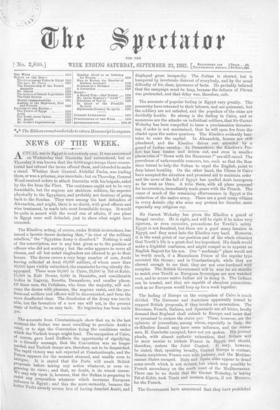The Khedive, acting, of course, under British instructions, has issued
a laconic decree declaring that, "in view of the military rebellion," the "Egyptian Army is dissolved." Nothing is said of the conscription, nor is any hint given as to the position of officers who did not mutiny ; but the order appears to cover all classes, and all but noted ringleaders are allowed to go to their homes. The decree covers a very large number of men, Arabi having collected at least 60,000 soldiers, of whom more than 40,000 have visibly submitted, the remainder having silently dis- appeared. There were 10,000 in Cairo, 20,000 in Tel-el-Kebir, 15,000 in Kafr Dower, 6,000 in Damietta, and considerable bodies in Zagazig, Rosetta, Damanhour, and smaller places. Of these men, the Fellaheen, who form the majority, will wel- come the decree with pleasure, the negroes resist, and the pro- fessional soldiers and officers till be discontented, and form the most disaffected class. The dissolution of the Army was inevit- able, but the formation of a new one will not, in the present state of feeling, be an easy task. No beginning has been made yet.






























